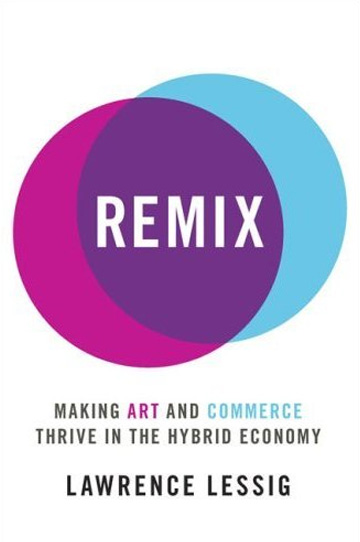Making Art and Commerce Thrive in the Hybrid Economy
Book dedications, while intensely meaningful to their recipients, are usually too simple and private to be more than vaguely poignant to the average reader. “To Véra,” wrote Nabokov at the beginning of “Lolita.” “To Annalena,” begin several of Ian McEwan‘s novels. How lovely, one thinks, before flipping ahead in search of Page 1.
The dedication of Lawrence Lessig’s new book tells more. Lessig devotes “Remix: Making Art and Commerce Thrive in the Hybrid Economy” to L. Ray Patterson and Jack Valenti – two names you shouldn’t necessarily recognize. Patterson, a law professor, believed in loosening the restrictions of copyright law, which regulates the use of creative works like books, films and songs.
Lessig has elsewhere described Valenti, who was president of the rabidly pro-copyright Motion Picture Association of America, as “the nation’s foremost extremist when it comes to the nature and scope of ‘creative property.’ ” Lessig’s decision to list them both is not some mawkish politician’s pose; it is a call for moderation in the increasingly shrill copyright wars – even if many regard Lessig as something of an extremist, too.
“Copyright law regulates culture in America. Copyright law must be changed. Changed, not abolished.” This is not simply the thesis of “Remix”; it is Lessig’s mission statement, and runs through his other books, academic writing and blogging. He seeks to ensure that copyright law, the sole purpose of which is encouraging creativity, does not end up stifling it instead.
Channeling geeks everywhere, Lessig labels traditional creative work “Read/Only” – as in a CD that you can play but can’t modify. The creativity of the future, by contrast, is “Read/Write”; it is interactive and can be remixed to create new works. No law prohibits a writer from quoting another work to make his own point; Lessig thinks we should also be able to do this in the digital world. One of his favorite examples is the band Girl Talk, which samples hundreds of brief clips from others’ songs to create a new sound of its own. But in its current iteration, copyright law stamps out this type of R/W culture through prohibitive licensing fees for samples and costly lawsuits for transgressors.
There is more at stake in this debate than artistic creativity. At the heart of “Remix” is an exploration of what Lessig calls the hybrid economy, which blends traditional commercial enterprise with the Internet-friendly ethos of sharing and community. Google’s YouTube is the perfect example: It relies on individuals to post videos, police the site for nastiness and market the brand by linking to YouTube videos elsewhere on the Web. In return users don’t get money, like traditional employees, but instead enjoy a valuable service – an accessible medium for sharing content. As with birds on the hippo’s back, everybody wins.
On a superficial level, copyright law has little to do with such an arrangement. But our draconian copyright regime nevertheless fosters a general anti-communitarian sentiment of “It’s mine, pay me” that threatens to trip up a hybrid economy that might otherwise improve lives and create profits.
In arguing this point, Lessig demonstrates his great strength as a reformer: He is politically ambidextrous. Although calls for “community” betray him as a liberal in sandals, he also clerked for two prominent conservative judges and can sound like a crabby libertarian firing warning shots from the porch. Reminding readers that copyright is a type of regulation, as well as a type of monopoly, will only help persuade those policymakers who might be inclined to view this debate through the simplistic lens of property rights.
So what changes are on offer? The first is to exempt amateur creativity from copyright law’s reach. This means no more threatening letters from industry lawyers to a mom who posts a home video of her child dancing to a Prince song, or to kids who never try to sell their sample creations. Another idea is to return copyright to the opt-in system it used to be, rather than setting the default at “all rights reserved.” Doing so would offer protection for those who want it, while letting works by indifferent artists, or those whose work is no longer commercially viable, pass into the public domain. Lessig has put these and other sensible reforms into practice by creating a new type of opt-in rights system called the Creative Commons, which is now used by millions.
The reason our copyright regime has flagged so badly, Lessig believes, is the influence of the aggressive record, film and music lobbies. He is therefore shifting his focus to regulation and government corruption; this is to be his last book on intellectual property. The field will be the worse without him, but any cause would be lucky to gain such a trenchant advocate.







